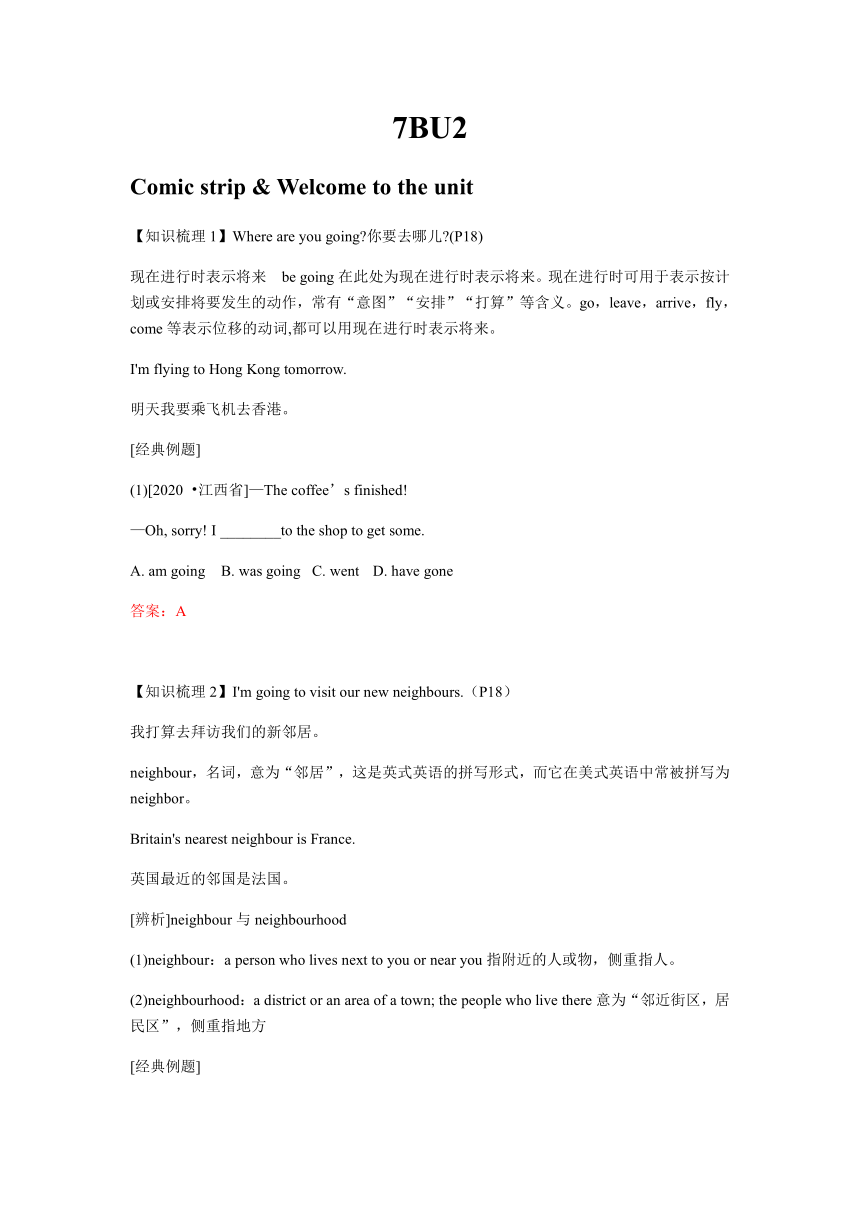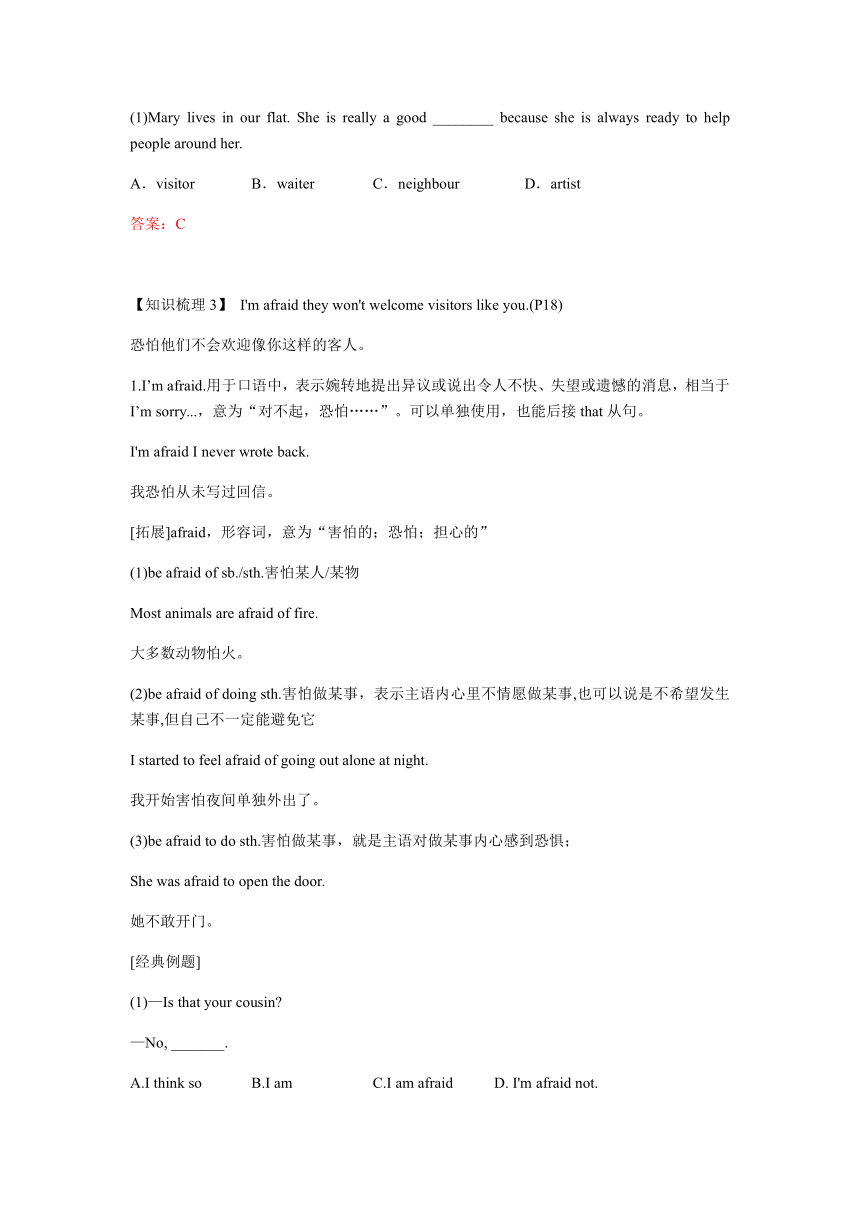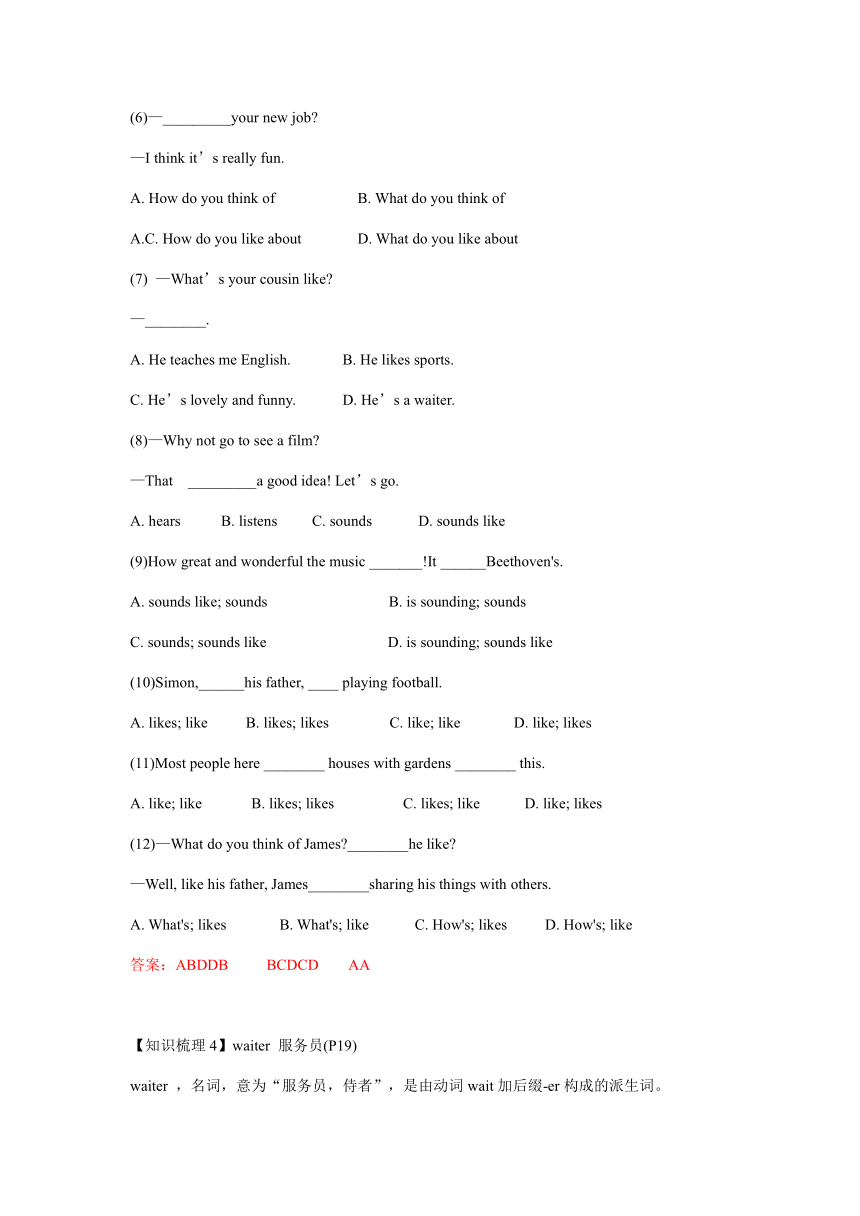Unit 2 Neighbours Welcome to the unit 知识点整理及练习 (含答案)
文档属性
| 名称 | Unit 2 Neighbours Welcome to the unit 知识点整理及练习 (含答案) |  | |
| 格式 | docx | ||
| 文件大小 | 20.9KB | ||
| 资源类型 | 教案 | ||
| 版本资源 | 牛津译林版 | ||
| 科目 | 英语 | ||
| 更新时间 | 2021-03-01 17:52:01 | ||
图片预览





文档简介
7BU2
Comic strip & Welcome to the unit
【知识梳理1】Where are you going?你要去哪儿?(P18)
现在进行时表示将来 be going在此处为现在进行时表示将来。现在进行时可用于表示按计划或安排将要发生的动作,常有“意图”“安排”“打算”等含义。go,leave,arrive,fly,come等表示位移的动词,都可以用现在进行时表示将来。
I'm flying to Hong Kong tomorrow.
明天我要乘飞机去香港。
[经典例题]
(1)[2020 ?江西省]—The coffee’s finished!
—Oh, sorry! I ________to the shop to get some.
A. am going B. was going C. went D. have gone
答案:A
【知识梳理2】I'm going to visit our new neighbours.(P18)
我打算去拜访我们的新邻居。
neighbour,名词,意为“邻居”,这是英式英语的拼写形式,而它在美式英语中常被拼写为neighbor。
Britain's nearest neighbour is France.
英国最近的邻国是法国。
[辨析]neighbour与neighbourhood
(1)neighbour:a person who lives next to you or near you指附近的人或物,侧重指人。
(2)neighbourhood:a district or an area of a town; the people who live there意为“邻近街区,居民区”,侧重指地方
[经典例题]
(1)Mary lives in our flat. She is really a good ________ because she is always ready to help people around her.
A.visitor B.waiter C.neighbour D.artist
答案:C
【知识梳理3】 I'm afraid they won't welcome visitors like you.(P18)
恐怕他们不会欢迎像你这样的客人。
1.I’m afraid.用于口语中,表示婉转地提出异议或说出令人不快、失望或遗憾的消息,相当于I’m sorry...,意为“对不起,恐怕……”。可以单独使用,也能后接that从句。
I'm afraid I never wrote back.
我恐怕从未写过回信。
[拓展]afraid,形容词,意为“害怕的;恐怕;担心的”
(1)be afraid of sb./sth.害怕某人/某物
Most animals are afraid of fire.
大多数动物怕火。
(2)be afraid of doing sth.害怕做某事,表示主语内心里不情愿做某事,也可以说是不希望发生某事,但自己不一定能避免它
I started to feel afraid of going out alone at night.
我开始害怕夜间单独外出了。
(3)be afraid to do sth.害怕做某事,就是主语对做某事内心感到恐惧;
She was afraid to open the door.
她不敢开门。
[经典例题]
(1)—Is that your cousin?
—No, _______.
A.I think so B.I am C.I am afraid D. I'm afraid not.
(2)________ you afraid of ________ late for school again?
A.Do; be B.Are; being C.Do; being D.Are; be
(3)—Excuse me, sir. Is the swimming pool open all day?
—________. Only from 6:30 p.m. to 9:30 p.m.
A.That's right B.Yes, of course C.Sorry, I'm afraid not D.I think so
(4)The girl is afraid ________.
A. at fly B. at flying C. of fly D. of flying
(5)—Will your father come to see your violin show tomorrow?
—______. He is having an important meeting in Shanghai now.
A. They’d like to B. You’re right
C. I’m afraid so D. I’m afraid not
答案:DBCDD
2.visitor,可数名词,意为“访问者;参观者”,是由动词visit加后缀-or构成的派生词。
One day, a visitor came to the village.
有一天,一个游客来到这个村庄。
[拓展]常见的以or结尾的表示人的名词有:
actor男演员
translator翻译
inventor.发明家
collector收集者
director导演
3.like,介词,意为“像.......一样”,其反义义词为unlike。
He looks like Father Christmas.
他长得像圣诞老人。
[拓展]like,动词,意为“喜欢”,其后常跟名词、代词或动词-ing形式,也可跟动词不定式。
。
I especially like sweet things.
我特别喜欢吃甜食。
[辨析]like和as
like,用于相似关系,即两者在形态上或性质上有相似之处,但并不等同。
as,用于说明同一关系,即两者实为一体
She talks to me like my mother.
她像我妈妈那样跟我说话。(她不是我妈妈)
She talks to me as a mother.
她以妈妈的身份跟我说话。( 她是我妈妈)
[经典例题]
(1)The sound_______ running water.
A. sounds like B. sounds C. like D. looks like
(2)Our neighbours are ready to help others. We are_______ a big family.
A. as B. like C. look like D. liking
(3)_________? --They are kind and helpful.
A. How are your neighbours like B. What do your neighbours like
C. How do your neighbours like D. What are your neighbours like
(4)-What does the boy like?
-He is_______ his father. He also_______ eating apples.
A. likes; like B. like; like C. likes; likes D. like, likes
(5)Now the smart phone is so helpful in our life. It_________a mini computer.
A. likes B. is like C. is liking D. like
(6)—_________your new job?
—I think it’s really fun.
A. How do you think of B. What do you think of
A.C. How do you like about D. What do you like about
(7) —What’s your cousin like?
—________.
A. He teaches me English. B. He likes sports.
C. He’s lovely and funny. D. He’s a waiter.
(8)—Why not go to see a film?
—That _________a good idea! Let’s go.
A. hears B. listens C. sounds D. sounds like
(9)How great and wonderful the music _______!It ______Beethoven's.
A. sounds like; sounds B. is sounding; sounds
C. sounds; sounds like D. is sounding; sounds like
(10)Simon,______his father, ____ playing football.
A. likes; like B. likes; likes C. like; like D. like; likes
(11)Most people here ________ houses with gardens ________ this.
A. like; like?? B. likes; likes ? C. likes; like? D. like; likes
(12)—What do you think of James?________he like?
—Well, like his father, James________sharing his things with others.
A. What's; likes B. What's; like C. How's; likes D. How's; like
答案:ABDDB BCDCD AA
【知识梳理4】waiter 服务员(P19)
waiter ,名词,意为“服务员,侍者”,是由动词wait加后缀-er构成的派生词。
Waiter, could you bring me some water?
服务员,给我送点儿水来好吗?
[拓展]常见的以er结尾的表示人的名词有:
worker 工人
teacher 教师
farmer 农民
[注意]cooker不表示“厨师”,而指的是“灶具”,cook才是“厨师”。
【知识梳理5】How many buildings are there in your neighbourhood?(P19)
在你的居民区里有多少幢楼?
how many 意为“多少”,用来提问可数名词的数量,后接可数名词的复数形式。
How many hours does she sleep?
她每天睡几个小时?
[拓展]含how的常见短语还有:
(1)How much 提问物品价格或不可数名词的量
How much homework do you get?
你有多少家庭作业?
How much is this coat?
那件外套多少钱?
(2)how often 提问频率
How often do you go swimming?
你多久去游泳一次?
(3)how long 多长(时间)提问一段时间或物体长度
How long is the River Nile?
尼罗河有多长?
How long does it take to get to the airport?
到机场要多长时间?
(4)how soon 多久以后 提问“in+一段时间”
How soon will he be back?
他多久能回来?
(5)How far 对距离提问
How far is it to your house from here?
从这儿到你家有多远?
[经典例题]
(1)How_______ is your house from the factory?
A. far B. away C. long way D. long
(2)—________ will Sandy come back from Beijing?
— In five days.
A. How far B. How soon C. How long D. How often
(3) —_______ do they go to see their teachers?
—Every year.
A. How long B. When C. How often D. How much time
(4)____ pieces of bread______ on the table?
A. How many, is there B. How much, is there
C. How many, are there D. How much, are there
(5)—How much water is there in the bottle?
—________.
A. No B. Nothing C. No one D. Much
(6)—________ books are there on the bookshelf?
—More than 300.
A.How much B.How often C.How many D.How long
(7)Do you know _________ people can live without sleep?
A. how long B. how often C. how far D. how soon
(8)—__________ does the bank open?
—Nine o’clock in the morning.
A. How soon B. How often C. What time D. What times
(9)—How long is this road?
—It’s __________
A. 50 meters long B. 50-meter-long
C. 50-meter long D. 50-meters-long
(10)We want to know_________ he will come back, as we are worried about his safety.
A. how often B. how soon C. how much D. how long
(11)- _______ will you finish reading these books?
-In about two weeks.
A. How long B. How often C. How soon D. When
(12) —_____________ is the Palace Museum from the hotel?
—It's about 40 minutes by bus.
A. How long B. How far C. How soon D. How away
(13)—Excuse me!__________is it from your home to school?
—About ten minutes' ride.
A. How long B. How much C. How far D. How often
(14)—Excuse me ___________ is the railway station, please?
—It’s about ____________ meters away. You can walk there.
A. how far, five hundreds B. how far, five hundred
C. how long, five hundred D. how long, five hundreds
(15)—How tall is_________CN Tower?
—It is .
A. the; 1,815-foot-tall B. /; 1,815 feet tall
C. ;/ 1,815-foot-tall D. the; 1,515 feet tall
(16)—_________is it from your home to the nearest police station?
—It's about three kilometres.
A. How far; away B. How far; far
C. How long; far D. How long; away
(17) —______ will it take you to get to school from your home by bus?
—About 10 minutes.
A. How soon B. How long C. How often D. How far
(18)— ________will you finish your dinner?
—Well, we still need some time. Maybe in twenty minutes.
A. How long B. How often C. How soon D. How far
答案:ABCDC CACAB CBCBD ABC
【知识梳理6】Most of them have 14 floors. 它们大多数有14层。(P19)
most of…,意为“…中的大多数”,其中most用作代词,意为“大多数,大部分”。most of后面接可数名词复数作主语时,谓语动词用复数形式;也可接不可数名词作主语,此时谓语动词用单数形式。
Most of the rooms face the sea.
多数房间朝海。
Most of the water goes back to the rivers, seas and oceans.
但大部分雨水会回到河流,海域以及大洋中去。
[拓展] most 还可用作限定词,意为“大多数,大部分”,后接可数名词复数或不可数名词。Most children like eating chocolate.
大部分孩子喜欢吃巧克力。
[经典例题]
(1)________ old people __________ health problem.
A. Most of; worry about B. Most; worry
C. Many; worry about D. Much; worry
答案:C
【知识梳理7】 It's good to live in a neighbourhood like that.(P19)
住在那样的一个居民区里(真)好。
It+be+形容词+to do sth. 是英语中一个常用的句式,意为“做某事是…”。it为形式主语,直正的主语是动词不定式(短语)。如果表示“对某人来说做某事是…的”,则用“It+be+形容词+for sb. +to do sth.”。如果表示“某人是…的做某事”,则用“It+be+形容词+of sb. +to do sth.”。
[经典例题]
(1)—How do you feel after watching the documentary(纪录片)Amazing China?
—Well, I think it is lucky for us_______this great country.
A. to live B. to live in C. living D. living in
(2)It is unnecessary ______ parents to always ______ about their kids.
A. of; care B. for; concerned C. for; worry D. of; worry
(3)It is warm-hearted ________ her to ______ us a lift to the train station.
A. for; carry B. of; give C. for; take D. of; bring
(4)It is necessary ______ students to work _______.
A. of; hardly B. for; hardly C. of; hard D. for; hard
答案:BCBD
Comic strip & Welcome to the unit
【知识梳理1】Where are you going?你要去哪儿?(P18)
现在进行时表示将来 be going在此处为现在进行时表示将来。现在进行时可用于表示按计划或安排将要发生的动作,常有“意图”“安排”“打算”等含义。go,leave,arrive,fly,come等表示位移的动词,都可以用现在进行时表示将来。
I'm flying to Hong Kong tomorrow.
明天我要乘飞机去香港。
[经典例题]
(1)[2020 ?江西省]—The coffee’s finished!
—Oh, sorry! I ________to the shop to get some.
A. am going B. was going C. went D. have gone
答案:A
【知识梳理2】I'm going to visit our new neighbours.(P18)
我打算去拜访我们的新邻居。
neighbour,名词,意为“邻居”,这是英式英语的拼写形式,而它在美式英语中常被拼写为neighbor。
Britain's nearest neighbour is France.
英国最近的邻国是法国。
[辨析]neighbour与neighbourhood
(1)neighbour:a person who lives next to you or near you指附近的人或物,侧重指人。
(2)neighbourhood:a district or an area of a town; the people who live there意为“邻近街区,居民区”,侧重指地方
[经典例题]
(1)Mary lives in our flat. She is really a good ________ because she is always ready to help people around her.
A.visitor B.waiter C.neighbour D.artist
答案:C
【知识梳理3】 I'm afraid they won't welcome visitors like you.(P18)
恐怕他们不会欢迎像你这样的客人。
1.I’m afraid.用于口语中,表示婉转地提出异议或说出令人不快、失望或遗憾的消息,相当于I’m sorry...,意为“对不起,恐怕……”。可以单独使用,也能后接that从句。
I'm afraid I never wrote back.
我恐怕从未写过回信。
[拓展]afraid,形容词,意为“害怕的;恐怕;担心的”
(1)be afraid of sb./sth.害怕某人/某物
Most animals are afraid of fire.
大多数动物怕火。
(2)be afraid of doing sth.害怕做某事,表示主语内心里不情愿做某事,也可以说是不希望发生某事,但自己不一定能避免它
I started to feel afraid of going out alone at night.
我开始害怕夜间单独外出了。
(3)be afraid to do sth.害怕做某事,就是主语对做某事内心感到恐惧;
She was afraid to open the door.
她不敢开门。
[经典例题]
(1)—Is that your cousin?
—No, _______.
A.I think so B.I am C.I am afraid D. I'm afraid not.
(2)________ you afraid of ________ late for school again?
A.Do; be B.Are; being C.Do; being D.Are; be
(3)—Excuse me, sir. Is the swimming pool open all day?
—________. Only from 6:30 p.m. to 9:30 p.m.
A.That's right B.Yes, of course C.Sorry, I'm afraid not D.I think so
(4)The girl is afraid ________.
A. at fly B. at flying C. of fly D. of flying
(5)—Will your father come to see your violin show tomorrow?
—______. He is having an important meeting in Shanghai now.
A. They’d like to B. You’re right
C. I’m afraid so D. I’m afraid not
答案:DBCDD
2.visitor,可数名词,意为“访问者;参观者”,是由动词visit加后缀-or构成的派生词。
One day, a visitor came to the village.
有一天,一个游客来到这个村庄。
[拓展]常见的以or结尾的表示人的名词有:
actor男演员
translator翻译
inventor.发明家
collector收集者
director导演
3.like,介词,意为“像.......一样”,其反义义词为unlike。
He looks like Father Christmas.
他长得像圣诞老人。
[拓展]like,动词,意为“喜欢”,其后常跟名词、代词或动词-ing形式,也可跟动词不定式。
。
I especially like sweet things.
我特别喜欢吃甜食。
[辨析]like和as
like,用于相似关系,即两者在形态上或性质上有相似之处,但并不等同。
as,用于说明同一关系,即两者实为一体
She talks to me like my mother.
她像我妈妈那样跟我说话。(她不是我妈妈)
She talks to me as a mother.
她以妈妈的身份跟我说话。( 她是我妈妈)
[经典例题]
(1)The sound_______ running water.
A. sounds like B. sounds C. like D. looks like
(2)Our neighbours are ready to help others. We are_______ a big family.
A. as B. like C. look like D. liking
(3)_________? --They are kind and helpful.
A. How are your neighbours like B. What do your neighbours like
C. How do your neighbours like D. What are your neighbours like
(4)-What does the boy like?
-He is_______ his father. He also_______ eating apples.
A. likes; like B. like; like C. likes; likes D. like, likes
(5)Now the smart phone is so helpful in our life. It_________a mini computer.
A. likes B. is like C. is liking D. like
(6)—_________your new job?
—I think it’s really fun.
A. How do you think of B. What do you think of
A.C. How do you like about D. What do you like about
(7) —What’s your cousin like?
—________.
A. He teaches me English. B. He likes sports.
C. He’s lovely and funny. D. He’s a waiter.
(8)—Why not go to see a film?
—That _________a good idea! Let’s go.
A. hears B. listens C. sounds D. sounds like
(9)How great and wonderful the music _______!It ______Beethoven's.
A. sounds like; sounds B. is sounding; sounds
C. sounds; sounds like D. is sounding; sounds like
(10)Simon,______his father, ____ playing football.
A. likes; like B. likes; likes C. like; like D. like; likes
(11)Most people here ________ houses with gardens ________ this.
A. like; like?? B. likes; likes ? C. likes; like? D. like; likes
(12)—What do you think of James?________he like?
—Well, like his father, James________sharing his things with others.
A. What's; likes B. What's; like C. How's; likes D. How's; like
答案:ABDDB BCDCD AA
【知识梳理4】waiter 服务员(P19)
waiter ,名词,意为“服务员,侍者”,是由动词wait加后缀-er构成的派生词。
Waiter, could you bring me some water?
服务员,给我送点儿水来好吗?
[拓展]常见的以er结尾的表示人的名词有:
worker 工人
teacher 教师
farmer 农民
[注意]cooker不表示“厨师”,而指的是“灶具”,cook才是“厨师”。
【知识梳理5】How many buildings are there in your neighbourhood?(P19)
在你的居民区里有多少幢楼?
how many 意为“多少”,用来提问可数名词的数量,后接可数名词的复数形式。
How many hours does she sleep?
她每天睡几个小时?
[拓展]含how的常见短语还有:
(1)How much 提问物品价格或不可数名词的量
How much homework do you get?
你有多少家庭作业?
How much is this coat?
那件外套多少钱?
(2)how often 提问频率
How often do you go swimming?
你多久去游泳一次?
(3)how long 多长(时间)提问一段时间或物体长度
How long is the River Nile?
尼罗河有多长?
How long does it take to get to the airport?
到机场要多长时间?
(4)how soon 多久以后 提问“in+一段时间”
How soon will he be back?
他多久能回来?
(5)How far 对距离提问
How far is it to your house from here?
从这儿到你家有多远?
[经典例题]
(1)How_______ is your house from the factory?
A. far B. away C. long way D. long
(2)—________ will Sandy come back from Beijing?
— In five days.
A. How far B. How soon C. How long D. How often
(3) —_______ do they go to see their teachers?
—Every year.
A. How long B. When C. How often D. How much time
(4)____ pieces of bread______ on the table?
A. How many, is there B. How much, is there
C. How many, are there D. How much, are there
(5)—How much water is there in the bottle?
—________.
A. No B. Nothing C. No one D. Much
(6)—________ books are there on the bookshelf?
—More than 300.
A.How much B.How often C.How many D.How long
(7)Do you know _________ people can live without sleep?
A. how long B. how often C. how far D. how soon
(8)—__________ does the bank open?
—Nine o’clock in the morning.
A. How soon B. How often C. What time D. What times
(9)—How long is this road?
—It’s __________
A. 50 meters long B. 50-meter-long
C. 50-meter long D. 50-meters-long
(10)We want to know_________ he will come back, as we are worried about his safety.
A. how often B. how soon C. how much D. how long
(11)- _______ will you finish reading these books?
-In about two weeks.
A. How long B. How often C. How soon D. When
(12) —_____________ is the Palace Museum from the hotel?
—It's about 40 minutes by bus.
A. How long B. How far C. How soon D. How away
(13)—Excuse me!__________is it from your home to school?
—About ten minutes' ride.
A. How long B. How much C. How far D. How often
(14)—Excuse me ___________ is the railway station, please?
—It’s about ____________ meters away. You can walk there.
A. how far, five hundreds B. how far, five hundred
C. how long, five hundred D. how long, five hundreds
(15)—How tall is_________CN Tower?
—It is .
A. the; 1,815-foot-tall B. /; 1,815 feet tall
C. ;/ 1,815-foot-tall D. the; 1,515 feet tall
(16)—_________is it from your home to the nearest police station?
—It's about three kilometres.
A. How far; away B. How far; far
C. How long; far D. How long; away
(17) —______ will it take you to get to school from your home by bus?
—About 10 minutes.
A. How soon B. How long C. How often D. How far
(18)— ________will you finish your dinner?
—Well, we still need some time. Maybe in twenty minutes.
A. How long B. How often C. How soon D. How far
答案:ABCDC CACAB CBCBD ABC
【知识梳理6】Most of them have 14 floors. 它们大多数有14层。(P19)
most of…,意为“…中的大多数”,其中most用作代词,意为“大多数,大部分”。most of后面接可数名词复数作主语时,谓语动词用复数形式;也可接不可数名词作主语,此时谓语动词用单数形式。
Most of the rooms face the sea.
多数房间朝海。
Most of the water goes back to the rivers, seas and oceans.
但大部分雨水会回到河流,海域以及大洋中去。
[拓展] most 还可用作限定词,意为“大多数,大部分”,后接可数名词复数或不可数名词。Most children like eating chocolate.
大部分孩子喜欢吃巧克力。
[经典例题]
(1)________ old people __________ health problem.
A. Most of; worry about B. Most; worry
C. Many; worry about D. Much; worry
答案:C
【知识梳理7】 It's good to live in a neighbourhood like that.(P19)
住在那样的一个居民区里(真)好。
It+be+形容词+to do sth. 是英语中一个常用的句式,意为“做某事是…”。it为形式主语,直正的主语是动词不定式(短语)。如果表示“对某人来说做某事是…的”,则用“It+be+形容词+for sb. +to do sth.”。如果表示“某人是…的做某事”,则用“It+be+形容词+of sb. +to do sth.”。
[经典例题]
(1)—How do you feel after watching the documentary(纪录片)Amazing China?
—Well, I think it is lucky for us_______this great country.
A. to live B. to live in C. living D. living in
(2)It is unnecessary ______ parents to always ______ about their kids.
A. of; care B. for; concerned C. for; worry D. of; worry
(3)It is warm-hearted ________ her to ______ us a lift to the train station.
A. for; carry B. of; give C. for; take D. of; bring
(4)It is necessary ______ students to work _______.
A. of; hardly B. for; hardly C. of; hard D. for; hard
答案:BCBD
